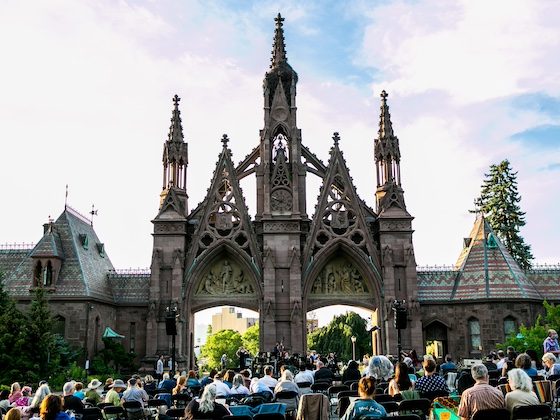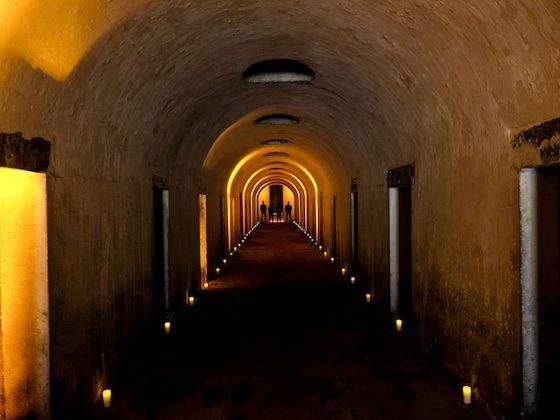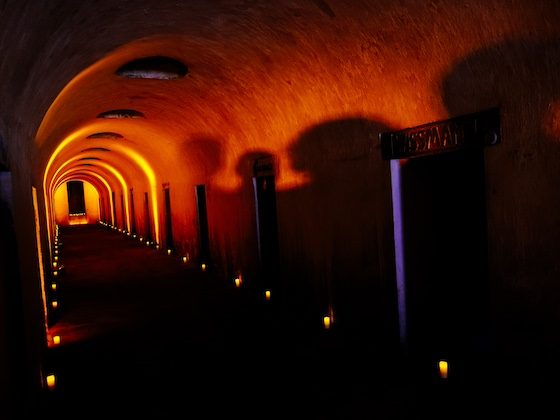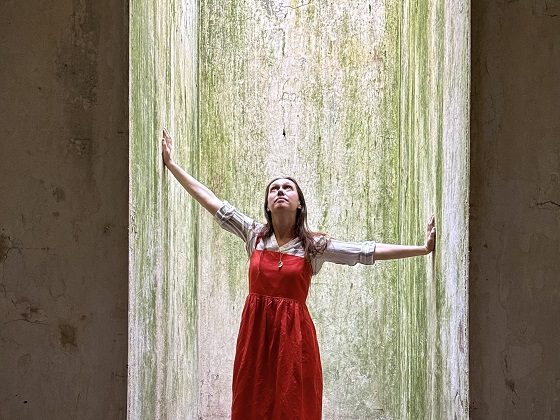(Sold Out) Christina and Michelle Naughton: An American in Paris
Green-Wood Cemetery 500 25th Street, Brooklyn, NY, United StatesThe Washington Post writes of twin sister piano duo Christina and Michelle Naughton, “They have to be heard to be believed.” And indeed, the pair performs with an almost inconceivably telepathic connection. For The Angel’s Share, the Naughtons will play a program bookended by Leonard Bernstein, in celebration of his 100th birthday year (and because his final resting place is but a stone’s throw from the Catacombs). In between, the sisters will alternate between American and French composers, including Ravel’s shimmering Ma mère l'Oye and Debussy’s En Blanc et Noir.
(SOLD OUT) The JACK Quartet: Modern Medieval
Green-Wood Cemetery 500 25th Street, Brooklyn, NY, United StatesThe JACK Quartet were called “superheroes of the new music world” by The Boston Globe, and there could be no more apt description for this endlessly adventurous ensemble. They’ve played pieces completely in the dark, performed on a raft in the middle of a lake, and more. For The Angel’s Share, they will play an extraordinary program that follows a musical thread from medieval plainsong through to the present day, drawing sonic similarities from wildly divergent works and echoing the timelessness of the space surrounding them.
(Sold Out) Gregg Kallor: Sketches from Frankenstein (World Premiere)
Green-Wood Cemetery 500 25th Street, Brooklyn, NY, United StatesMary Shelly’s groundbreaking novel Frankenstein was published 200 years ago. But far from the grunting Hollywood brutishness of Boris Karloff, the original told the heartbreaking story of a living, feeling creature, brought into the world only to be forsaken by his creator and left to fend for himself in a hostile world. Drawing the parallels to modern society, pianist/composer Gregg Kallor will offer the World Premiere of a new suite of operatic sketches based on the monster’s harrowing tale, in a partnership with On Site Opera. The program will also feature his other acclaimed vocal works, and the premiere of a solo piano piece in tribute to Leonard Bernstein.
(Sold Out) Gregg Kallor: Sketches from Frankenstein (World Premiere)
Green-Wood Cemetery 500 25th Street, Brooklyn, NY, United StatesMary Shelly’s groundbreaking novel Frankenstein was published 200 years ago. But far from the grunting Hollywood brutishness of Boris Karloff, the original told the heartbreaking story of a living, feeling creature, brought into the world only to be forsaken by his creator and left to fend for himself in a hostile world. Drawing the parallels to modern society, pianist/composer Gregg Kallor will offer the World Premiere of a new suite of operatic sketches based on the monster’s harrowing tale, in a partnership with On Site Opera. The program will also feature his other acclaimed vocal works, and the premiere of a solo piano piece in tribute to Leonard Bernstein.
(Sold Out) Gregg Kallor: Sketches from Frankenstein (World Premiere)
Green-Wood Cemetery 500 25th Street, Brooklyn, NY, United StatesMary Shelly’s groundbreaking novel Frankenstein was published 200 years ago. But far from the grunting Hollywood brutishness of Boris Karloff, the original told the heartbreaking story of a living, feeling creature, brought into the world only to be forsaken by his creator and left to fend for himself in a hostile world. Drawing the parallels to modern society, pianist/composer Gregg Kallor will offer the World Premiere of a new suite of operatic sketches based on the monster’s harrowing tale, in a partnership with On Site Opera. The program will also feature his other acclaimed vocal works, and the premiere of a solo piano piece in tribute to Leonard Bernstein.
Burgers, Bourbon, & Beethoven
We’ll be launching Season 2 of The Angel’s Share with the first-ever “Burgers, Bourbon & Beethoven Festival.” What’s that, you ask? Oh no big deal, just literally **the best event ever conceived in the history of humanity.** It starts with Burgers - four different slider recipes, served up to you straight from the grill, which you’ll rate on the Burger Club (www.brgrclub.com) website. Then it goes to Bourbon - tasting a generous spread of top-notch spirits from some of the area’s finest purveyors. And it finishes, as all good parties must, with a rousing performance of Beethoven’s 5th Symphony, performed by the String Orchestra of Brooklyn.
Purcell: Dido and Aeneas
Henry Purcell wrote Dido & Aeneas in 1680, but this tragic meditation on destiny, love, and death resonates just as powerfully today. Director Alek Shrader interweaves excerpts from Christopher Marlowe’s play based on the same story, infusing a sense of agency and dignity back to the character of the wounded queen, and the terrible decision she faces when abandoned by the love of her life. With superstar Daniela Mack as Dido, you won't want to miss her sing the heartrending final aria “When I Am Laid in Earth” (while...in...a...Catacomb!)
Purcell: Dido and Aeneas
Henry Purcell wrote Dido & Aeneas in 1680, but this tragic meditation on destiny, love, and death resonates just as powerfully today. Director Alek Shrader interweaves excerpts from Christopher Marlowe’s play based on the same story, infusing a sense of agency and dignity back to the character of the wounded queen, and the terrible decision she faces when abandoned by the love of her life. With superstar Daniela Mack as Dido, you won't want to miss her sing the heartrending final aria “When I Am Laid in Earth” (while...in...a...Catacomb!)
Purcell: Dido and Aeneas
Henry Purcell wrote Dido & Aeneas in 1680, but this tragic meditation on destiny, love, and death resonates just as powerfully today. Director Alek Shrader interweaves excerpts from Christopher Marlowe’s play based on the same story, infusing a sense of agency and dignity back to the character of the wounded queen, and the terrible decision she faces when abandoned by the love of her life. With superstar Daniela Mack as Dido, you won't want to miss her sing the heartrending final aria “When I Am Laid in Earth” (while...in...a...Catacomb!)
Purcell: Dido and Aeneas
Henry Purcell wrote Dido & Aeneas in 1680, but this tragic meditation on destiny, love, and death resonates just as powerfully today. Director Alek Shrader interweaves excerpts from Christopher Marlowe’s play based on the same story, infusing a sense of agency and dignity back to the character of the wounded queen, and the terrible decision she faces when abandoned by the love of her life. With superstar Daniela Mack as Dido, you won't want to miss her sing the heartrending final aria “When I Am Laid in Earth” (while...in...a...Catacomb!)
Epilogues and Epitaphs
Most people wouldn’t equate “historically-informed Baroque chamber music” with “soul-blasting, face-melting hot sauce fire”... at least not until they hear Augusta McKay Lodge. She and her band Voyage Sonique bring a gas torch to the works of a bygone era, burning a path through a series of musical monuments to grief and remembrance.
Epilogues and Epitaphs
Most people wouldn’t equate “historically-informed Baroque chamber music” with “soul-blasting, face-melting hot sauce fire”... at least not until they hear Augusta McKay Lodge. She and her band Voyage Sonique bring a gas torch to the works of a bygone era, burning a path through a series of musical monuments to grief and remembrance.
Epilogues and Epitaphs
Most people wouldn’t equate “historically-informed Baroque chamber music” with “soul-blasting, face-melting hot sauce fire”... at least not until they hear Augusta McKay Lodge. She and her band Voyage Sonique bring a gas torch to the works of a bygone era, burning a path through a series of musical monuments to grief and remembrance.
Liszt: Poetic and Religious Harmonies
Almost no one plays the complete Poetic and Religious Harmonies by Franz Liszt. Between the sheer finger-bending virtuosity, emotionally-draining intensity, and epic length, each of the ten movements stands as its very own musical monolith. But when experienced all together, the cycle gains an almost mystical transcendence, a spiritual journey from the opening “Invocation,” the meditative glow of “The Blessing of God in Solitude,” the anguish of “Funeral,” and the quiet rapture of “Hymn of Love.” It’s a lot for one pianist to take on, and that’s why we’ve got two of ‘em: keyboard stars Adam Tendler and Jenny Lin, both bringing their unique talents and vision to their respective half of the piece.
Liszt: Poetic and Religious Harmonies
Almost no one plays the complete Poetic and Religious Harmonies by Franz Liszt. Between the sheer finger-bending virtuosity, emotionally-draining intensity, and epic length, each of the ten movements stands as its very own musical monolith. But when experienced all together, the cycle gains an almost mystical transcendence, a spiritual journey from the opening “Invocation,” the meditative glow of “The Blessing of God in Solitude,” the anguish of “Funeral,” and the quiet rapture of “Hymn of Love.” It’s a lot for one pianist to take on, and that’s why we’ve got two of ‘em: keyboard stars Adam Tendler and Jenny Lin, both bringing their unique talents and vision to their respective half of the piece.
Liszt: Poetic and Religious Harmonies
Almost no one plays the complete Poetic and Religious Harmonies by Franz Liszt. Between the sheer finger-bending virtuosity, emotionally-draining intensity, and epic length, each of the ten movements stands as its very own musical monolith. But when experienced all together, the cycle gains an almost mystical transcendence, a spiritual journey from the opening “Invocation,” the meditative glow of “The Blessing of God in Solitude,” the anguish of “Funeral,” and the quiet rapture of “Hymn of Love.” It’s a lot for one pianist to take on, and that’s why we’ve got two of ‘em: keyboard stars Adam Tendler and Jenny Lin, both bringing their unique talents and vision to their respective half of the piece.
Liszt: Poetic and Religious Harmonies
Almost no one plays the complete Poetic and Religious Harmonies by Franz Liszt. Between the sheer finger-bending virtuosity, emotionally-draining intensity, and epic length, each of the ten movements stands as its very own musical monolith. But when experienced all together, the cycle gains an almost mystical transcendence, a spiritual journey from the opening “Invocation,” the meditative glow of “The Blessing of God in Solitude,” the anguish of “Funeral,” and the quiet rapture of “Hymn of Love.” It’s a lot for one pianist to take on, and that’s why we’ve got two of ‘em: keyboard stars Adam Tendler and Jenny Lin, both bringing their unique talents and vision to their respective half of the piece.
Pergolesi: Stabat Mater
The Stabat Mater is a medieval poem that describes the suffering of Jesus’s mother Mary as she stands at the foot of the cross. Pergolesi’s setting of the text is among the most haunting and gut wrenching compositions ever put to paper. At one point, the piece asks us if it’s possible to watch someone else suffer so deeply, and not somehow share in their sorrow. It stands as one of the purest musical depictions of empathy, and a powerful reminder that - no matter what pain we may feel in the moment - we’re never truly alone in our sadness. Performed by the String Orchestra of Brooklyn, the program will also feature Barber’s wrenching Adagio for Strings, and Arvo Pärt’s slow-burning Fratres, and if that all wasn’t enough - the entire performance will feature wall-to-ceiling film projections up and down the catacombs, from the masters Ricardo Romaneiro and Mau.
Pergolesi: Stabat Mater
The Stabat Mater is a medieval poem that describes the suffering of Jesus’s mother Mary as she stands at the foot of the cross. Pergolesi’s setting of the text is among the most haunting and gut wrenching compositions ever put to paper. At one point, the piece asks us if it’s possible to watch someone else suffer so deeply, and not somehow share in their sorrow. It stands as one of the purest musical depictions of empathy, and a powerful reminder that - no matter what pain we may feel in the moment - we’re never truly alone in our sadness. Performed by the String Orchestra of Brooklyn, the program will also feature Barber’s wrenching Adagio for Strings, and Arvo Pärt’s slow-burning Fratres, and if that all wasn’t enough - the entire performance will feature wall-to-ceiling film projections up and down the catacombs, from the masters Ricardo Romaneiro and Mau.
Pergolesi: Stabat Mater
The Stabat Mater is a medieval poem that describes the suffering of Jesus’s mother Mary as she stands at the foot of the cross. Pergolesi’s setting of the text is among the most haunting and gut wrenching compositions ever put to paper. At one point, the piece asks us if it’s possible to watch someone else suffer so deeply, and not somehow share in their sorrow. It stands as one of the purest musical depictions of empathy, and a powerful reminder that - no matter what pain we may feel in the moment - we’re never truly alone in our sadness. Performed by the String Orchestra of Brooklyn, the program will also feature Barber’s wrenching Adagio for Strings, and Arvo Pärt’s slow-burning Fratres, and if that all wasn’t enough - the entire performance will feature wall-to-ceiling film projections up and down the catacombs, from the masters Ricardo Romaneiro and Mau.
Angel’s Share: Spring, Strings, and Tasty Things
After three years of alliterative magnificence, beginning with the legendary Burgers, Bourbon & Beethoven Festival, we've decided that we should stop limiting ourselves to just one choice of food, drink, and musical repertoire. This year, we open our hearts, minds, and gullets, to take in a smorgasbord of sounds, sips, and sumptuous victuals.
Angel’s Share: Beethoven’s String Quartet No. 15, Op. 132
Beethoven's final String Quartet is an indescribably powerful, transcendently life-affirming masterpiece. Its movements are centered around the towering slow section, which Beethoven wrote after recovering from a terrible illness, solemnly titling it a “Hymn of thanks to God from one who is healed.” In times of despair and division, the beauty of this music remains a balm to the soul, and a reminder of how we can find strength in our darkest moments.
Angel’s Share: Beethoven’s String Quartet No. 15, Op. 132
Beethoven's final String Quartet is an indescribably powerful, transcendently life-affirming masterpiece. Its movements are centered around the towering slow section, which Beethoven wrote after recovering from a terrible illness, solemnly titling it a “Hymn of thanks to God from one who is healed.” In times of despair and division, the beauty of this music remains a balm to the soul, and a reminder of how we can find strength in our darkest moments.
Angel’s Share: Beethoven’s String Quartet No. 15, Op. 132
Beethoven's final String Quartet is an indescribably powerful, transcendently life-affirming masterpiece. Its movements are centered around the towering slow section, which Beethoven wrote after recovering from a terrible illness, solemnly titling it a “Hymn of thanks to God from one who is healed.” In times of despair and division, the beauty of this music remains a balm to the soul, and a reminder of how we can find strength in our darkest moments.
Angel’s Share: Beethoven’s String Quartet No. 15, Op. 132
Beethoven's final String Quartet is an indescribably powerful, transcendently life-affirming masterpiece. Its movements are centered around the towering slow section, which Beethoven wrote after recovering from a terrible illness, solemnly titling it a “Hymn of thanks to God from one who is healed.” In times of despair and division, the beauty of this music remains a balm to the soul, and a reminder of how we can find strength in our darkest moments.
Angel’s Share: Beethoven’s String Quartet No. 15, Op. 132
Beethoven's final String Quartet is an indescribably powerful, transcendently life-affirming masterpiece. Its movements are centered around the towering slow section, which Beethoven wrote after recovering from a terrible illness, solemnly titling it a “Hymn of thanks to God from one who is healed.” In times of despair and division, the beauty of this music remains a balm to the soul, and a reminder of how we can find strength in our darkest moments.
Angel’s Share: Beethoven’s String Quartet No. 15, Op. 132
Beethoven's final String Quartet is an indescribably powerful, transcendently life-affirming masterpiece. Its movements are centered around the towering slow section, which Beethoven wrote after recovering from a terrible illness, solemnly titling it a “Hymn of thanks to God from one who is healed.” In times of despair and division, the beauty of this music remains a balm to the soul, and a reminder of how we can find strength in our darkest moments.
Angel’s Share: Caroline Shaw’s Partita
Caroline Shaw's Pulitzer Prize-winning Partita for 8 Voices is a work of profound emotional beauty, a timeless expression that feels at home in any musical era. For these performances, the groundbreaking vocal talents of Fourth Wall Ensemble will weave together a program that begins with improvised medieval chant, flowing seamlessly through the Renaissance and Baroque periods, before arriving at Shaw's staggering sonic suite.
Angel’s Share: Caroline Shaw’s Partita
Caroline Shaw's Pulitzer Prize-winning Partita for 8 Voices is a work of profound emotional beauty, a timeless expression that feels at home in any musical era. For these performances, the groundbreaking vocal talents of Fourth Wall Ensemble will weave together a program that begins with improvised medieval chant, flowing seamlessly through the Renaissance and Baroque periods, before arriving at Shaw's staggering sonic suite.
Angel’s Share: Caroline Shaw’s Partita
Caroline Shaw's Pulitzer Prize-winning Partita for 8 Voices is a work of profound emotional beauty, a timeless expression that feels at home in any musical era. For these performances, the groundbreaking vocal talents of Fourth Wall Ensemble will weave together a program that begins with improvised medieval chant, flowing seamlessly through the Renaissance and Baroque periods, before arriving at Shaw's staggering sonic suite.
Angel’s Share: mɔɹnɪŋ [morning//mourning]
mɔɹnɪŋ (the phonetic spelling for the word "morning" as well as the word "mourning") is an operatic masterpiece by singer and composer Gelsey Bell, which begins just after humanity has disappeared entirely from the Earth, and traces the weeks, months, years, and millennia that follow. What emerges is a journey through time that is simultaneously whimsical, fantastical, playful and profound, offering a poignant reminder of what it means to be human – despite taking place entirely after our species has vanished from the planet. This specially-adapted production of this critically-acclaimed opera was created just for the Catacombs.
Angel’s Share: mɔɹnɪŋ [morning//mourning]
mɔɹnɪŋ (the phonetic spelling for the word "morning" as well as the word "mourning") is an operatic masterpiece by singer and composer Gelsey Bell, which begins just after humanity has disappeared entirely from the Earth, and traces the weeks, months, years, and millennia that follow. What emerges is a journey through time that is simultaneously whimsical, fantastical, playful and profound, offering a poignant reminder of what it means to be human – despite taking place entirely after our species has vanished from the planet. This specially-adapted production of this critically-acclaimed opera was created just for the Catacombs.
Angel’s Share: mɔɹnɪŋ [morning//mourning]
mɔɹnɪŋ (the phonetic spelling for the word "morning" as well as the word "mourning") is an operatic masterpiece by singer and composer Gelsey Bell, which begins just after humanity has disappeared entirely from the Earth, and traces the weeks, months, years, and millennia that follow. What emerges is a journey through time that is simultaneously whimsical, fantastical, playful and profound, offering a poignant reminder of what it means to be human – despite taking place entirely after our species has vanished from the planet. This specially-adapted production of this critically-acclaimed opera was created just for the Catacombs.
Angel’s Share: mɔɹnɪŋ [morning//mourning]
mɔɹnɪŋ (the phonetic spelling for the word "morning" as well as the word "mourning") is an operatic masterpiece by singer and composer Gelsey Bell, which begins just after humanity has disappeared entirely from the Earth, and traces the weeks, months, years, and millennia that follow. What emerges is a journey through time that is simultaneously whimsical, fantastical, playful and profound, offering a poignant reminder of what it means to be human – despite taking place entirely after our species has vanished from the planet. This specially-adapted production of this critically-acclaimed opera was created just for the Catacombs.
Angel’s Share: mɔɹnɪŋ [morning//mourning]
mɔɹnɪŋ (the phonetic spelling for the word "morning" as well as the word "mourning") is an operatic masterpiece by singer and composer Gelsey Bell, which begins just after humanity has disappeared entirely from the Earth, and traces the weeks, months, years, and millennia that follow. What emerges is a journey through time that is simultaneously whimsical, fantastical, playful and profound, offering a poignant reminder of what it means to be human – despite taking place entirely after our species has vanished from the planet. This specially-adapted production of this critically-acclaimed opera was created just for the Catacombs.
Angel’s Share: mɔɹnɪŋ [morning//mourning]
mɔɹnɪŋ (the phonetic spelling for the word "morning" as well as the word "mourning") is an operatic masterpiece by singer and composer Gelsey Bell, which begins just after humanity has disappeared entirely from the Earth, and traces the weeks, months, years, and millennia that follow. What emerges is a journey through time that is simultaneously whimsical, fantastical, playful and profound, offering a poignant reminder of what it means to be human – despite taking place entirely after our species has vanished from the planet. This specially-adapted production of this critically-acclaimed opera was created just for the Catacombs.
Green-Wood’s public programs are made possible by the New York State Council on the Arts with the support of the Office of the Governor and the New York State Legislature, as well as the New York City Department of Cultural Affairs.




